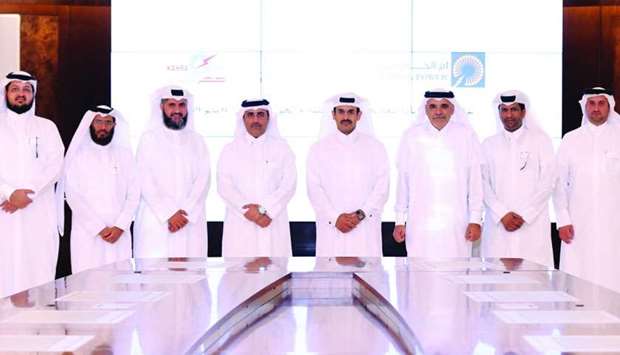The General Electricity and Water Corporation - Kahramaa and Umm Al Houl Power Co signed an agreement on Monday to increase water desalination capacity by 61.5mn gallons per day (about 280,000 cubic metres), which enhances Kahramaa’s capabilities for a sustainable supply of high quality water and electricity in Qatar.
The agreement was signed by Kahramaa president Essa bin Hilal Al Kuwari, and Umm Al Houl Power chairman Fahad Hamad al-Muhannadi, in the presence of HE the Minister of State for Energy Affairs, President and CEO of Qatar Petroleum Saad bin Sherida al-Kaabi.
Under the agreement, Umm Al Houl will build and operate an expansion to the existing plant that would raise its overall capacity to 198mn gallons of water per day by 2021.
HE Saad Sherida al-Kaabi welcomed the agreement saying, "This agreement is a continuation of Kahramaa’s efforts to secure the country’s water and electricity needs in support of the growth of the national economy and the requirements of the comprehensive and sustainable development witnessed by Qatar."
He added, "This also comes as an affirmation of our environmental commitment to using state-of-the-art desalination technology such as reverse osmosis.”
Kahramaa said that the expansion will use the new reverse osmosis technology, which will improve production efficiency and reduce the use of gas.
Umm Al Houl Power will act as project’s developer, while Samsung will be the main contractor and Acciona will be the supplier and sub-contractor.
Kahramaa has adopted a long-term strategy to assess future water and electricity demand and to reach agreements with independent energy and water providers to meet the increase in demand and to enhance the supply of water and electricity, in light of the development witnessed by the country.
Umm Al Houl plant generates 2,520 megawatt of electricity and 136.5mn gallons of drinking water per day, 60mn of which is desalinated using reverse osmosis and 76.5mn using multiple-stage flash technology. The plant is considered as one of the largest in the Middle East, and one of the most environmental-friendly. It provides 30% of Qatar’s electricity needs and 40% of its water needs. (QNA)

